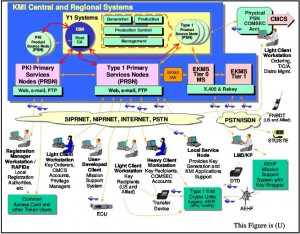 The makers of the Opera Web browser are urging users to apply an update that fixes what the company described as an “extremely severe” security flaw in Windows and Mac versions of the software. The vulnerability is fixed in the latest version, v. 10.53, available from this link. Alternatively, Opera users can click “Help” then “Check for Updates” from within the browser.
The makers of the Opera Web browser are urging users to apply an update that fixes what the company described as an “extremely severe” security flaw in Windows and Mac versions of the software. The vulnerability is fixed in the latest version, v. 10.53, available from this link. Alternatively, Opera users can click “Help” then “Check for Updates” from within the browser.
Accused Mariposa Botnet Operators Sought Jobs at Spanish Security Firm
 Luis Corrons spent much of the last year helping Spanish police with an investigation that led to the arrest of three local men suspected of operating and renting access to a massive and global network of hacked computers. Then, roughly 60 days after their arrest, something strange happened: Two of them unexpectedly turned up at Corrons’ office and asked to be hired as security researchers.
Luis Corrons spent much of the last year helping Spanish police with an investigation that led to the arrest of three local men suspected of operating and renting access to a massive and global network of hacked computers. Then, roughly 60 days after their arrest, something strange happened: Two of them unexpectedly turned up at Corrons’ office and asked to be hired as security researchers.
Corrons, a technical director and blogger for Spanish security firm Panda Security, said he received a visit from the hackers on the morning of March 22. The two men, known by the online nicknames “Netkairo” and “Ostiator,” were arrested in February by Spanish police for their alleged role in running the “Mariposa” botnet, a malware distribution platform that spread malicious software to more than 12 million Internet addresses from 190 countries (mariposa is Spanish for “butterfly”).
Now, here the two Mariposa curators were at Panda’s headquarters in Bilbao, their resumes in hand, practically begging for a job, Corrons said.
“At first, I couldn’t believe it, and I thought someone in the office was playing a practical joke on me,” Corrons said. “But these guys were the real guys, and they were serious.
“Ostiator told me, ‘The thing is, with everything that’s been happening, we’re not earning any money at the moment,” Corrons recalled. “He said, ‘We thought we could look for some kind of agreement in which both sides would benefit. We think we have knowledge [that] could be useful to Panda and thought we could have some kind of agreement with Panda.'”
Spanish police do not typically release the names of individuals who have been arrested, and Netkairo and Ostiator haven’t yet been charged with any crime. But Corrons recognized that the names and addresses on the resumes matched those that police had identified as residences belonging to Netkairo and Ostiator.
Corrons said Panda’s lawyers were unwilling to release the full names of the two men that visited Panda Labs, but said Ostiator’s first name is Juan Jose, and that he is a 25-year-old male from Santiago de Compostela. Corrons said Netkairo is a 31-year-old from Balmaseda named Florencio.
Shortly after the arrests were announced, local Spanish media said the third individual arrested by Spanish authorities in connection with Mariposa — a 30-year-old identified by his initials “JPR” — used the hacker nickname “Johny Loleante” and lived in Molina de Segura, Murcia.
On Mar. 3, I had the opportunity to interview Captain Cesar Lorenzana, deputy head technology crime division of the Spanish Civil Guard. Lorenzana told Krebsonsecurity.com that Netkairo and his associate were earning about 3,000 Euros each month renting out the Mariposa botnet to other hackers.
Interviewing the same hackers less than three weeks later, Corrons asked them how they got started creating Mariposa.
“Basically, they said they started it as kind of a hobby, and that they weren’t working at the time,” Corrons said. “Suddenly, they started to earn money, a few hundred Euros a week to start, and then discovered they couldn’t stop. And the whole time, their network kept growing.”
NSA on Computer Network Attack & Defense
I spent the past few days in Mexico City participating in the annual meeting of the Honeynet Project, an international group dedicated to developing and deploying technologies that collect intelligence on the methods malicious hackers use in their attacks. The event brought in experts from around the globe, and our hosts — the National Autonomous University of Mexico (in Spanish, UNAM) were gracious and helpful.
As it happens, honeynets and other “deception technologies” are among the approaches discussed in the following document, written by the National Security Agency‘s Information Assurance Directorate. A source of mine passed it along a while back, but I only rediscovered it recently. I could not find a public version of this document that was published online previously, so it has been uploaded here.
 The 605-page PDF document reads like a listing of the pros and cons for a huge array of defensive and counterintelligence approaches and technologies that an entity might adopt in defending its networks. Of particular interest to me was the section on deception technologies, which discusses the use of honeynet technology to learn more about attackers’ methods, as well as the potential legal and privacy aspects of using honeynets. Another section delves into the challenges of attributing the true origin(s) of a computer network attack.
The 605-page PDF document reads like a listing of the pros and cons for a huge array of defensive and counterintelligence approaches and technologies that an entity might adopt in defending its networks. Of particular interest to me was the section on deception technologies, which discusses the use of honeynet technology to learn more about attackers’ methods, as well as the potential legal and privacy aspects of using honeynets. Another section delves into the challenges of attributing the true origin(s) of a computer network attack.
The document is a final draft from back in 2004, although I’m told the final version of the document varies little from this copy. In any event, it may be surprising to some to see how many of the techniques, technologies and challenges detailed in this document remain relevant and timely six years later. It is embedded in this blog as a Scribd file, viewable after the jump (the document is > 5mb, so please be patient). I removed the Scribd embedded PDF, because it was causing problems for too many readers. The full PDF is available at this link here.
A Closer Look at Rapport from Trusteer
 A number of readers recently have written in to say their banks have urged customers to install a security program called Rapport as a way to protect their online bank accounts from fraud. The readers who pinged me all said they didn’t know much about this product, and did I recommend installing it? Since it has been almost two years since I last reviewed the software, I thought it might be useful to touch base with its creators to see how this program has kept pace with the latest threats.
A number of readers recently have written in to say their banks have urged customers to install a security program called Rapport as a way to protect their online bank accounts from fraud. The readers who pinged me all said they didn’t know much about this product, and did I recommend installing it? Since it has been almost two years since I last reviewed the software, I thought it might be useful to touch base with its creators to see how this program has kept pace with the latest threats.
The basics elements of Rapport – designed by a company called Trusteer — haven’t changed much. As I wrote in May 2008, the software works by assuming control over the application programming interfaces or APIs in Windows, the set of tools which allow software developers to create programs that interact with key Windows functionalities.
From that 2008 piece:
“Some of today’s nastiest data-stealing malware works by hijacking these Windows APIs. For example, keyloggers simply hijack or ‘hook’ the Windows API that handles the transmission of data from user interfaces, such as the keyboard and mouse. A more advanced type of malware – known as a ‘form grabber’ – hijacks the ‘WinInet‘ API – which sets up the SSL (think https://) transaction between the user’s browser and the encrypted Web site. By hijacking this API, a form grabber can rip out usernames and passwords even when the user is submitting them into a site that encrypts the data during transmission because it grabs that information at the lower level of the operating system, before it is encrypted.
Trusteer’s software examines these and other vital Windows APIs to see if any other process is trying to intercept sensitive data. It then blocks those that do.”
I spoke last week with Trusteer CEO Mickey Boodaei about his company’s software, how it has changed over the years, and what’s new about it.
BK: A lot of customers are being asked to download the software and don’t know much about Trusteer or Rapport. One customer wrote in banked at BBVA, and another was with Fifth Third. Both banks very recently had multiple customers lose hundreds of thousands of dollars to the sort of online banking fraud I’ve been writing about lately.
MB: Well, the more press coverage we get, the more it will help build familiarity with our brand among consumers.
BK: Since we last talked, you were working with just a handful of banks — such as ING. Can you talk about how the business has grown and who you’re partnering with now?
MB: Over the last year in the U.S., we’ve been seeing a significant change in the amount of interest we’re getting from banks, especially around business banking. It looks like banks are getting really worried about it, as many have seen fairly significant fraud losses. Right now in North America we have around 50 banks using our technology, and few others in the United Kingdom.
Read on after the jump for my thoughts on this software, and a discussion of some of the malware that specifically targets Rapport.
Infamous Storm Worm Stages a Comeback
The “Storm Worm,” a strain of malicious software once responsible for blasting out 20 percent of spam sent worldwide before it died an ignominious death roughly 18 months ago, was resurrected this week. Researchers familiar with former strains of the worm say telltale fingerprints in the new version strongly suggest that it was either rebuilt by its original creators or was sold to another criminal malware gang.
Fake Anti-virus Peddlers Outmaneuvering Legitimate AV
Purveyors of fake anti-virus or “scareware” programs have aggressively stepped up their game to evade detection by legitimate anti-virus programs, according to new data from Google.
In a report being released today, Google said that between January 2009 and the end of January 2010, its malware detection infrastructure found some 11,000 malicious or hacked Web pages that attempted to foist fake anti-virus on visitors. The search giant discovered that as 2009 wore on, scareware peddlers dramatically increased both the number of unique strains of malware designed to install fake anti-virus as well as the frequency with which they deployed hacked or malicious sites set up to force the software on visitors.
Fake anti-virus attacks use misleading pop-ups and videos to scare users into thinking their computers are infected and offer a free download to scan for malware. The bogus scanning programs then claim to find oodles of infected files, and victims who fall for the ruse often are compelled to register the fake anti-virus software for a fee in order to make the incessant malware warnings disappear. Worse still, fake anti-virus programs frequently are bundled with other malware. What’s more, victims end up handing their credit or debit card information over to the people most likely to defraud them.
 Google found that miscreants spreading fake anti-virus have over the last six months taken aggressive steps to evade the two most prevalent countermeasures against scareware: The daily updates shipped by the legitimate anti-virus makers designed to detect scareware installers; and programs like Google’s which scan millions of Web pages for malicious software and flag search results that lead to malware.
Google found that miscreants spreading fake anti-virus have over the last six months taken aggressive steps to evade the two most prevalent countermeasures against scareware: The daily updates shipped by the legitimate anti-virus makers designed to detect scareware installers; and programs like Google’s which scan millions of Web pages for malicious software and flag search results that lead to malware.
Google’s automated system scanned each potentially malicious page in real time using a number of licensed anti-virus engines, and all of the files were rescanned again at the end of the study. Beginning in June 2009, Google charted a massive increase in the number of unique fake anti-virus installer programs, a spike that Google security experts posit was a bid to overwhelm the ability of legitimate anti-virus programs to detect the programs. Indeed, the company discovered that during that time frame, the number of unique installer programs increased from an average of 300 to 1,462 per day, causing the detection rate to plummet to below 20 percent.
“We found that if you have anti-virus protection installed on your computer but the [malware detection] signatures for it are out-of-date by just a couple of days, this can drastically reduce the detection rates,” said Niels Provos, principal software engineer for Google’s infrastructure group. “It turns out that the closer you get to now, the commercial anti-virus programs were doing a much worse job at detecting pages that were hosting fake anti-virus payloads.”
To Catch a Mule
Much digital ink has been spilled in this blog detailing the activities of so-called “money mules,” willing or unwitting individuals here in the United States who are lured into laundering money for international organized cyber crime gangs. The subject almost always generates fierce debate among readers about whether these mules should be prosecuted, and the debate usually hinges on whether the mules knew that they were contributing to a crime.
Of course, ignorance of the law is no excuse, and this blog entry is in no way meant to defend the mules. But I did want to shed more light on the efforts that some mule recruitment gangs take to help potential mules believe they are in fact working for a legitimate company.
Take, for example, the efforts of what we’ll call the “Back Office,” mule recruitment gang — so named because the Web sites used to recruit and manage these folks almost always include the term “backoffice”. Potential Back Office mules are recruited via e-mail, with a message stating that the employer found the recipient’s resume on a job search site and would he or she be interested in working as a financial agent in an international finance company?
Those who respond are directed to create an account at a Back Office site, and from there the new recruits are processed through a series of interviews. According to conversations with multiple mules recruited by the Back Office gang, the process normally starts with a lengthy telephone interview, wherein the recruit is asked about his or her work history, ethics and attitudes.
Following the verbal interview, mules are asked to complete a lengthy questionnaire that asks roughly three dozen questions, including many that one might expect to find in a legitimate interview for a professional position.
“How do you evaluate success?”
“What classes or seminars have you taken on your own during the last three years to advance your careers and personal growth?
Charting the Carnage from eBanking Fraud
 Aaron Jacobson of Authentify put together this map of all 43 of the U.S. commercial e-banking victims I’ve mentioned in stories at Krebsonsecurity.com and at the Washington Post’s Security Fix blog.
Aaron Jacobson of Authentify put together this map of all 43 of the U.S. commercial e-banking victims I’ve mentioned in stories at Krebsonsecurity.com and at the Washington Post’s Security Fix blog.
Clicking on this Google Maps link brings up an interactive version of this map showing the names of the victim at each point on the map, as well as their monetary losses.
What’s interesting that I hadn’t realized before seeing this map is that the victims appear to be heavily clustered in the East Coast and Midwest. I’m not sure if there is a connection, but the thieves perpetrating these attacks typically recruit their money mules almost exclusively from these regions. The thinking is that the criminals — most of whom reside in the Eastern European Time Zone (EET), don’t want to spend all night managing these mules. As such, they crooks tend not to solicit mules from those living in the Western United States. Again, there may not be an actual link between the mule trend and the grouping of victims, but just thought it was worth noting.
Hiding from Anti-Malware Search Bots
 Malicious hackers spend quite a bit of time gaming the Internet search engines in a bid to have their malware-laden sites turn up on the first page of search results for hot, trending news topics. Increasingly, though, computer criminals also are taking steps to block search engines bots from indexing legitimate Web pages that have been hacked and booby-trapped with hostile code.
Malicious hackers spend quite a bit of time gaming the Internet search engines in a bid to have their malware-laden sites turn up on the first page of search results for hot, trending news topics. Increasingly, though, computer criminals also are taking steps to block search engines bots from indexing legitimate Web pages that have been hacked and booby-trapped with hostile code.
Search giants Yahoo! and Google each have automated programs that crawl millions of Web sites each week in search of those hosting malicious code. When the search providers find these sites, they typically append a warning to the hacked Web site’s listing in search results, alerting the would-be visitor that the site could be dangerous. These warnings not only result in fewer people visiting infected sites, but they have a tendency to alert a listed site’s owners to a malware problem that needs attention.
This is all well and good for you and me, but not so wonderful for the bad guys. Unless, of course, said bad guys have planned ahead, by inserting code in their hacked sites that hands out malicious code to everyone except the automated anti-malware bots deployed by the top search providers.
Which is precisely what security expert David Dede found earlier this month while analyzing some Web-based malware.
Rogue Antivirus Gangs Seize on McAfee Snafu
Purveyors of rogue anti-virus, a.k.a. “scareware,” often seize upon hot trending topics in their daily efforts to beef up the search engine rankings of their booby-trapped landing pages. So it’s perhaps no surprise that these scammers are capitalizing on search terms surrounding McAfee, which just yesterday shipped a faulty anti-virus update that caused serious problems for a large number of customers.







